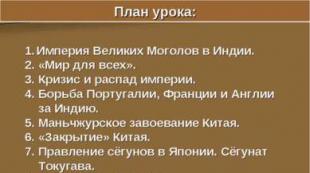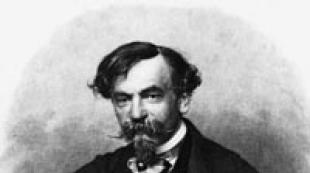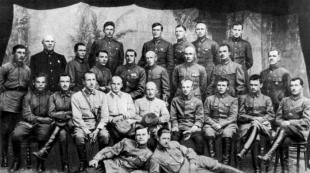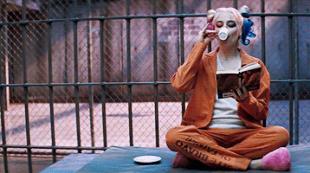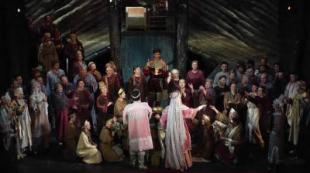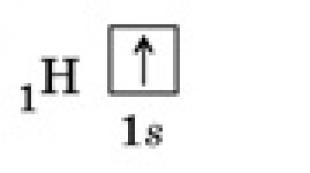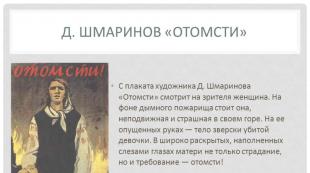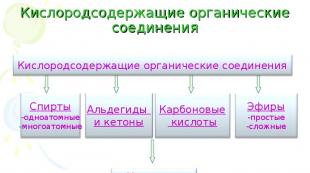Moral of the story: The donkey saw the nightingale. Ivan Krylov. Fable "The Donkey and the Nightingale". Donkey and nightingale
Krylov's fable: The donkey and the nightingale
The donkey and the nightingale - Krylov's fable- The donkey saw the nightingale
And he says to him: “Listen, buddy!
You, they say, are a great master of singing.
I would really like
Judge for yourself, having heard your singing,
How great is your skill?"
Here Nightingale began to show his art:
Clicked and whistled
On a thousand frets, pulled, shimmered;
Then gently he weakened
And the languid sound of the pipe echoed in the distance,
Then it suddenly scattered in small fractions throughout the grove.
Everyone was paying attention then
To Aurora's favorite and singer;
The winds have died down, the choirs of birds have fallen silent,
And the herds lay down
Breathing a little, the shepherd admired him
And only sometimes
Listening to the Nightingale, he smiled at the shepherdess.
The singer has died. The donkey, staring at the ground with his forehead,
“Pretty much,” he says, “it’s not false to say,
I can listen to you without getting bored;
It's a pity that I don't know
You are with our rooster;
If only you had become more alert,
If only I could learn a little from him."
Hearing this judgment, my poor Nightingale
He took off and flew far away.
God save us from such judges.
An unfair situation, when an ignorant person undertakes to judge things beyond his control of his mind and taste, occurs offensively often. This is the fable “The Donkey and the Nightingale” by Ivan Krylov.
Conflict
Contemporaries said that the poet was inspired to create the work by an incident from his life. A high-ranking nobleman, having listened to Krylov’s artistic performance of fables, praised the writer, but chided him for not following the example of another author (who wrote much weaker than Krylov). Having poured out his resentment in the fable, Ivan Andreevich still managed to create an illustration of a typical disagreement between an undeniably talented creator and an ignorant but self-confident critic. The conflict is doomed to be eternal. Its repeated projection into our lives took place with the advent of times when “the cook began to rule the state.” For creators who have experienced moments of painful bewilderment when influential people condescendingly patted them on the shoulder, saying outright nonsense about their works, it is gratifying to see an allegorical depiction of this collision as represented by the fable “The Donkey and the Nightingale.”
Artistic media
The author generously uses to depict the characters, the style of speech of the heroes, and describe the absurdity of the situation. First of all, opposition comes into play. The donkey, the personification of stubbornness and stupidity, contrasts with the Nightingale - a symbol of inspiration and poetry. Donkey's rough speech immediately reveals his uncouth and ambitious nature. He addresses the Nightingale in a simple way: buddy, master... The donkey has heard about the Nightingale’s charming singing, but doubts: “... is this really great... skill?” The Nightingale's answer - heavenly singing - delights everything around. The noun “skill” used by the Donkey is contrasted with the art revealed by the Nightingale.

The author offers a cascade of verbs that reinforce each other, conveying a uniquely beautiful trill: “clicked,” “whistled,” “shimmered,” “pulled,” “gently weakened,” “resounded like a pipe,” “scattered like a shot.” The fable “The Donkey and the Nightingale” depicts the complete harmony that arises in nature and in the souls of people from the Nightingale’s song. It is not for nothing that the author uses high vocabulary here: everyone listened to the pet, it became quiet, the herd lay down. There is a pastoral motif. The narrative reaches its climax when the shepherd boy listens to the Nightingale “breathing a little.” As soon as the song stops, Donkey throws out his ponderous assessment: “Pretty much!” Krylov multiplies the satirical effect by describing how a “profound” critic reacts to the singer’s reverent art: stupidly “staring at the ground with his forehead.” He just “can listen to the Nightingale without getting bored.” And of course, he considers himself a great connoisseur, so he believes that it is his duty to teach. The donkey importantly remarks, inserting here the colloquial word “perked up,” that the Nightingale would sing better if he “learned a little” from the rooster. The moral of the fable “The Donkey and the Nightingale” is expressed in a short and succinct phrase: “God, deliver us from such judges.” And in fact, false donkey authority is a great obstacle to the path of art, designed to ennoble life.
Krylov's fable “The Donkey and the Nightingale” in sheet music
The plot of Krylov’s story inspired Russian composers to create works of the same name on this topic. Dmitry Shostakovich, in his composition “Two Fables by I. Krylov,” conveyed with extraordinary expression the clash of life positions of the characters in melodic language. Rimsky-Korsakov's romance based on the words of a popular fable is also very expressive.

Incompetence, inertia, lack of tact, inability for subtle emotional impulses - these are the qualities that the fable “The Donkey and the Nightingale” ridicules, or rather, its author - the brilliant publicist, poet and translator Ivan Andreevich Krylov.
One of the most common vices of all humanity is the love of evaluating everything and everyone, regardless of the presence of reasons for this, the necessary knowledge, and other things. This vice formed the basis of the fable “The Donkey and the Nightingale.”
Fable "The Donkey and the Nightingale"
The donkey saw the nightingale
And he says to him: “Listen, buddy!
You, they say, are a great master of singing.
I would really like
Judge for yourself, having heard your singing,
How great is your skill?”
Here Nightingale began to show his art:
Clicked and whistled
On a thousand frets, pulled, shimmered;
Then gently he weakened
And the languid sound of the pipe echoed in the distance,
Then it suddenly scattered in small fractions throughout the grove.
Everyone was paying attention then
To Aurora's favorite and singer;
The winds have died down, the choirs of birds have fallen silent,
And the herds lay down
Breathing a little, the shepherd admired him
And only sometimes
Listening to the Nightingale, he smiled at the shepherdess.
The singer has died. The donkey, staring at the ground with his forehead,
“Pretty much,” he says, “it’s not false to say,
I can listen to you without getting bored;
It's a pity that I don't know
You are with our rooster;
If only you had become more alert,
If only I could learn a little from him,”
Hearing this judgment, my poor Nightingale
He took off and flew to distant fields.
God save us from such judges.
Moral of Krylov's fable “The Donkey and the Nightingale”
The moral in the fable “The Donkey and the Nightingale” is the conclusion of the story: the author concluded it in the last line. Although even without it, it is obvious to the reader how ridiculous and absurd the assessment looks to those who have absolutely no idea what they are judging.
Analysis of the fable “The Donkey and the Nightingale”
In the presented fable, the main action takes place between two heroes: Donkey and Nightingale.
- The first is an ignorant character who knows nothing about singing and has no ear for music at all, but is so self-confident as to undertake to evaluate the singing of a nightingale.
- The second is a real talent (this is confirmed by the author’s numerous epithets addressed to him, and descriptions of the actions that took place while he was singing with those around him), a master of his craft, and everyone knows about this except the Donkey, who asks the bird to demonstrate his skills.
Having absolutely no understanding of music and being a stupid animal by nature, the Donkey criticizes what he heard and calls on the Nightingale to take lessons from the rooster - a noisy bird that screams in the morning without hearing or melody. Insulted by such a comparison, the Nightingale, without saying a word, simply flies away.
Through the prism of the situation described in the fable “The Donkey and the Nightingale,” Ivan Andreevich wanted to show the reader how stupid it is to be offended and prove something to judges, who most often do not understand at all what they are criticizing/judging. The reason for this teaching was a real incident from the life of Krylov, when one of the nobles of that time (according to some, he was Count Razumovsky, according to others, Prince A. N. Golitsyn) asked the fabulist to read several of his works, and then asked, why they differ from those that Ivan Ivanovich Dmitriev writes, thereby insulting the “Nightingale” of Russian literature.
Winged expressions from the fable “The Donkey and the Nightingale”
“God deliver us from such judges” is a reproach phrase from the fable “The Donkey and the Nightingale” to ignorant critics.
Donkey and nightingale drawing
Read text online
The donkey saw the nightingale
And he says to him: “Listen, buddy!
You, they say, are a great master of singing.
I would really like
Judge for yourself, having heard your singing,
How great is your skill?"
Here Nightingale began to show his art:
Clicked and whistled
On a thousand frets, pulled, shimmered;
Then gently he weakened
And the languid sound of the pipe echoed in the distance,
Then it suddenly scattered in small fractions throughout the grove.
Everyone was paying attention then
To Aurora's favorite and singer;
The winds have died down, the choirs of birds have fallen silent,
And the herds lay down
Breathing a little, the shepherd admired him
And only sometimes
Listening to the Nightingale, he smiled at the shepherdess.
The singer has died. The donkey, staring at the ground with his forehead,
“Pretty much,” he says, “it’s not false to say,
I can listen to you without getting bored;
It's a pity that I don't know
You are with our rooster;
If only you had become more alert,
If only I could learn a little from him."
Hearing this judgment, my poor Nightingale
He took off and flew far away.
God save us from such judges.
Moral of Ivan Krylov's fable The Donkey and the Nightingale
God save us from such judges
Moral in your own words, the main idea and meaning of the fable The Donkey and the Nightingale
You cannot judge without knowing the matter. You cannot listen to judges who do not understand the issue or are simply stupid. Sometimes it is impossible to correctly assess an event or action if all the circumstances are unknown.
The donkey met the nightingale and asked him to sing. He sang and was beautiful. Everyone listened. But the donkey advised him to learn from the rooster. The nightingale flew away.
Analysis of the fable The donkey and the nightingale, the heroes of the fable
The main characters of the fable are a donkey and a nightingale. The fable begins directly with the development of events. Each of the heroes is an indicator of opposing qualities.
Nightingale- This is a beautiful singing bird. Everyone likes his singing. His voice was given to him by nature. In the form of a nightingale, Krylov shows a man, a master of his craft. The nightingale is proud of his voice, because everyone who hears his singing highly appreciates his talent. Krylov chose the words well to describe the situation around the nightingale, as well as the reactions of other animals.
U donkey on the contrary, there is neither hearing nor voice. Despite this, he believes that he has the right to evaluate the nightingale’s talent. Because he has no ear for music, he says that even a rooster could sing better. Comparing the nightingale and the rooster, this makes us even more convinced of how stupid the donkey is. By this he offends the nightingale, because everyone admires his singing. By comparing the nightingale and the rooster, the donkey thereby shows that he has no idea about the real art of singing.
In the role of the donkey, on the contrary, there is a person who has no idea about this craft. Despite the fact that the donkey does not understand anything about singing, he tells the nightingale that he sings poorly. This often happens among people. A person who doesn’t understand anything about the profession tells the master what to do and how to do it. In this fable, the donkey is portrayed as an ignoramus.
The meaning of the fable is that often people who do not understand any profession give advice to masters. They criticize and point out that they are doing something wrong. But real criticism can be given by a professional like this person. In this case, the professional is the nightingale. And only nightingales like him can give criticism.
The author ridicules the donkey's disrespect for the nightingale. He makes it clear that you can’t judge someone if you don’t understand it yourself. But here we are talking not only about them, but also about ordinary people. The same thing happens to people in everyday life.
Before judging someone, you need to think about whether you can do it yourself. If a person has no idea about this craft, then he cannot judge it either.
To do this, you will need to prove that the judging person cannot do something like a professional. In this case, if the nightingale asked the donkey to sing as well, then naturally he would not be able to. Thus, he would be able to prove that the donkey has no right to judge his singing.
The fable “The Donkey and the Nightingale” was written no later than 1811. She was born thanks to one story that happened with Krylov. Ivan Andreevich was well aware of his strength in the fable genre. One nobleman decided to personally meet the fabulist. He called him to his place and asked him to read two or three fables. Krylov artistically read several fables and between them one, borrowed from La Fontaine. The nobleman listened favorably to the fables and thoughtfully asked why Krylov does not translate fables like Ivan Dmitriev? The wounded Krylov replied that he could not, but upon returning home, he, touched to the quick, wrote the fable “The Donkey and the Nightingale,” in which he poured out the bile that remained from the nobleman’s visit.
The fable tells how the Donkey, having listened to the wonderful singing of the Nightingale, complained that the Nightingale was unfamiliar with the Rooster, from whom, according to the Donkey, the Nightingale could learn the skill of singing. By Nightingale in this fable, Krylov understood himself. There are several versions about Donkey. Some believed that Donkey meant a nobleman who placed Dmitriev above Krylov. Someone talked about Prince A.N. Golitsin. Still others were inclined towards the candidacy of Count Razumovsky. But it is not known for certain which of the nobles served as the prototype for the Donkey. It is possible that this is a collective image.
But not only this story became the reason for writing the fable. Krylov had previously met people who self-confidently judged matters and things about which they had not the slightest idea. Such “judges” are characterized by a certain contradiction in behavior. They are self-confident, but, as a rule, ignorant. Such a contradiction evokes ridicule from any outside observer. It is with ridicule that Krylov treats this kind of people in his fable.
Krylov, having decided to ridicule a similar phenomenon that occurs in our lives, chose an allegorical way to depict it. He represents a skilled artist in the image of the Nightingale. The choice was made successfully, since Nightingale, more than anyone else, can be likened to a talented artist. The judge in the fable is the Donkey, with whom readers associate the concept of stupidity and stupidity.
Since the characters' personalities are clear to the reader, the author begins the fable directly with the development of the action. The donkey wants to check other people's rumors about the nightingale's singing and calls the singer to him. Since the whole power of the story should lie in the contradiction between the ignorant judgment of the Donkey and the wonderful art of the nightingale, Krylov describes the nightingale's art in detail, emphasizing how beautiful it is. Then he shows the impression that the Nightingale made on everything around him, and finally moves on to the donkey’s judgment. The judge speaks condescendingly about the singing and only regrets that the Nightingale is unfamiliar with the rooster. The rooster is chosen here in order to depict, without further ado, the taste of a donkey: what could be more opposite than in the singing of the Nightingale and the crowing of a cock? The writer’s irony is mainly concentrated in this opposition, which is further strengthened by the Nightingale’s advice to learn a little from the rooster. What could Nightingale do with such advice? That’s what he did: “He took off and flew to distant fields.”
Allegory and irony are the basis of the literary treatment of this plot. Allegory is based on similarity, irony on opposites. Since the action of the fable is taken from real life, the expressions of the characters are borrowed from the same place.
Krylov is a great master of expressing himself in the folk spirit; but then, next to such expressions as “friend, master,” he also encounters others that do not in any way go in tune with them, for example, “everyone then listened to Aurora’s favorite and singer.”
Speaking further about the impression that the Nightingale made on everything around him with his singing, Krylov allows for a certain exaggeration: “the winds died down, the choirs of birds fell silent and the herds lay down.” Also, the images of a shepherdess and a shepherdess are taken from the imaginary happy life of a shepherd, which was described in various works of that time. The so-called “shepherd” poetry developed in the literature of Western peoples, passed on to us and caused imitation.
The moral of the fable “The Donkey and the Nightingale” is: “God, deliver us from such judges.”
What is the main meaning of the fable “The Donkey and the Nightingale”?
It is unlawful for an ignoramus to begin to judge matters in which he does not understand and is not an expert. Only a specialist in this topic can criticize constructively and give advice.
What shortcomings does Krylov ridicule in the fable “The Donkey and the Nightingale”?
Criticism, incompetence, ignorance, inability to be objective, stupidity, biased preaching.
